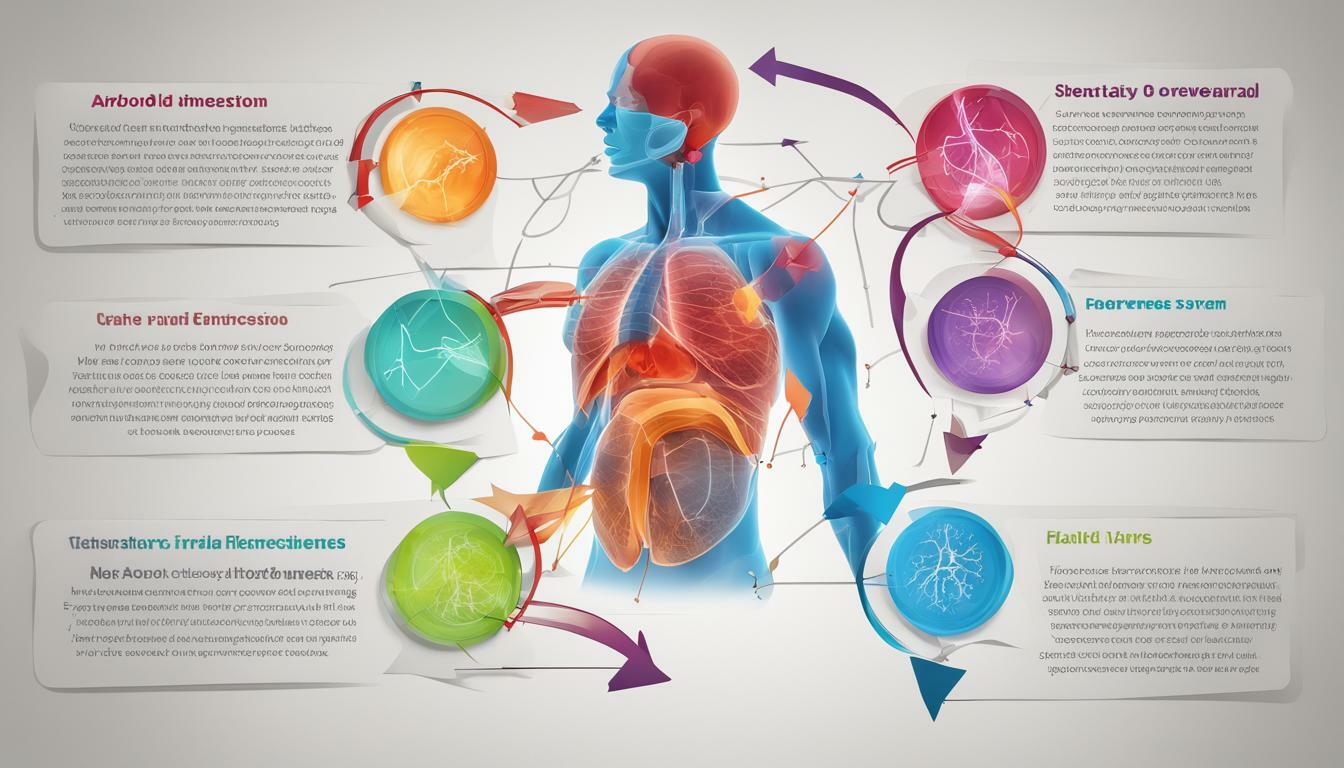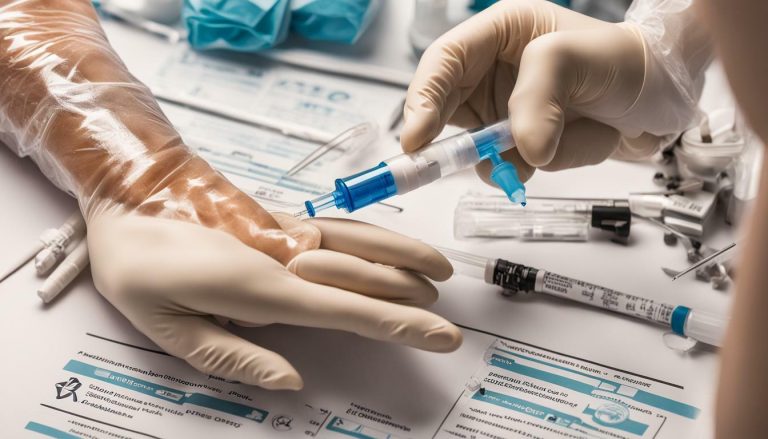How Long Does it Take for Steroids to Work for a Chest Infection?
If you have a chest infection, your doctor may prescribe steroids to help reduce inflammation and relieve symptoms. But how long does it take for steroids to work in treating a chest infection, and how long should you take them for optimal results?
In this section, we will explore the timeline of steroids for chest infections and the recommended duration of steroid therapy. We will also discuss the speed at which steroids work to promote recovery and address potential side effects of this treatment.
Key Takeaways:
- Steroids can effectively reduce inflammation and relieve symptoms of chest infections.
- The typical duration of steroid therapy for chest infections is one to two weeks.
- It is important to closely follow the prescribed duration of steroid therapy and consult a healthcare professional for guidance.
- Potential side effects of steroid treatment for chest infections include mood changes, increased appetite, and difficulty sleeping.
Understanding Steroid Treatment for Chest Infections
Chest infections can cause discomfort and lead to various complications if not treated promptly. Steroid treatment is one approach that can help alleviate symptoms and promote recovery. Steroids work by reducing inflammation in the respiratory system and improving breathing function in individuals with chest infections.
The effectiveness of steroids in treating chest infections varies based on individual factors such as the severity of the infection, the presence of underlying health conditions, and the individual’s immune response. However, on average, steroids are considered a reliable treatment option for chest infections.
The typical timeline of steroid treatment for a chest infection can range from a few days to a couple of weeks. The duration of steroid therapy depends on various factors such as the individual’s response to treatment, the stage of the infection, and the presence of any adverse reactions.
It is important to closely monitor the response to steroid treatment and follow the recommended duration of therapy for effective outcomes. While steroids can reduce inflammation and promote recovery, they can also have potential side effects. Thus, it is essential to seek medical supervision and guidance during the treatment period.
In conclusion, steroid treatment is an effective approach for treating chest infections. It works by reducing inflammation and promoting respiratory function. The typical timeline of steroid therapy differs based on various factors. It is crucial to closely monitor the response to treatment and follow medical guidance to promote a timely recovery.
The Duration of Steroid Therapy for Chest Infection
Steroid therapy can be an effective treatment for chest infections, but it is crucial to adhere to the recommended duration of treatment for optimal outcomes. The duration of steroid therapy for a chest infection can vary depending on various factors, including the severity of the infection and individual patient characteristics.
The typical duration of a steroid course for a chest infection is usually around a week or two. It is important to complete the full prescribed course of steroids, even if symptoms improve before the end of the treatment period. Stopping the treatment prematurely can result in recurrent symptoms and may also contribute to the development of antibiotic resistance.
The Speed of Steroid Treatment for Chest Infection
Steroids are known for their fast-acting properties in treating chest infections. The response time to steroid treatment can vary depending on individual factors and the severity of the infection. However, on average, patients may begin to experience relief from symptoms within a few days of commencing steroid therapy.
It is crucial to note that the speed of steroid treatment is not indicative of the duration of treatment. A full course of steroids for a chest infection usually lasts for a week or two, regardless of when symptoms begin to alleviate.
In some instances, the response time to steroid treatment may be delayed or prolonged. This could be due to factors such as the patient’s age, underlying health conditions, or the type of infection being treated. It is important to closely monitor the progress of the treatment and consult a healthcare professional if symptoms persist or worsen.
The optimal length of a steroid course for a chest infection will depend on various factors, including the severity and type of infection, as well as the individual’s overall health. The healthcare professional prescribing the treatment will provide guidance on the recommended duration of the steroid course.
Potential Side Effects of Steroid Treatment for Chest Infection
Steroid treatment is generally safe and effective in managing chest infections. However, like any medication, there are potential side effects that individuals should be aware of.
The duration of steroid therapy for a chest infection can range from a few days to a few weeks, depending on the severity of the infection and the individual’s response to treatment. Common side effects of steroid treatment for chest infections include:
- Increased appetite
- Difficulty sleeping
- Mood changes, such as irritability or restlessness
- Gastrointestinal symptoms, such as indigestion or nausea
In rare cases, steroid treatment may also lead to more serious side effects, such as:
- Increased risk of infections
- Elevated blood sugar levels
- Vision changes or eye problems
- Fluid retention
If any of these side effects occur or worsen, individuals should promptly notify their healthcare provider. It is important to follow the prescribed duration of steroid therapy as abruptly stopping treatment can lead to withdrawal symptoms and increase the risk of a relapse.
After completing the prescribed steroid course, most individuals will experience a significant reduction in symptoms and an improvement in their condition. However, the recovery time after completing a course of steroids for chest infection can vary depending on the severity of the infection and other individual factors. It is important to continue monitoring symptoms and seeking medical supervision as needed to ensure a full recovery.
Best Practices for Steroid Treatment of Chest Infections in Australia
When it comes to treating chest infections with steroids, the recommended duration of treatment can vary depending on individual factors such as the severity of the infection and the patient’s overall health.
In general, the standard course of steroid therapy for chest infections is usually around one to two weeks. It is vital to follow the prescribed duration of treatment, even if symptoms improve, to ensure the infection is fully cleared and to prevent relapse or resistance.
The duration of steroid therapy for chest infections may also depend on the type of steroid used and the route of administration (i.e. oral or inhaled). A doctor will determine the most appropriate type of steroid and dosage based on individual factors and the type and severity of the chest infection.
It is also important to note that steroid therapy should never be self-administered, and a healthcare professional should always be consulted for guidance.
In addition to steroid therapy, other supportive treatments may also be beneficial in enhancing recovery from chest infections. These may include appropriate rest, hydration, and over-the-counter medications such as pain relievers and cough suppressants.
Overall, to ensure the best outcomes of steroid treatment for chest infections in Australia, individuals should closely follow medical guidance, complete the full course of treatment, and incorporate other supportive treatments as recommended. By adhering to best practices, individuals can promote a timely recovery from chest infections while minimizing the risk of adverse effects.
Conclusion
In conclusion, the duration of steroid treatment for a chest infection can vary depending on various factors. However, on average, steroids typically begin to work within a few days and the treatment course usually lasts for a week or two.
It is important to closely follow the prescribed duration of steroid therapy and consult a healthcare professional for guidance. Steroids can effectively reduce inflammation and relieve symptoms, but it is crucial to be aware of potential side effects and seek medical supervision.
Seeking Medical Supervision
Individuals should seek medical supervision if they experience any adverse reactions to steroid treatment or their symptoms do not improve after a few days. It is important to report any new or worsening symptoms to a healthcare professional promptly.
The optimal duration of steroid therapy for chest infections may vary based on individual factors, such as age, overall health, and underlying medical conditions. A healthcare professional can assess these factors and provide tailored guidance on the appropriate length of treatment.
Adhering to Best Practices
Adhering to best practices is critical for promoting a timely recovery from chest infections. This includes completing the full course of prescribed steroids and following any other recommended treatments, such as rest and adequate hydration.
Additionally, individuals can take steps to support their recovery by maintaining a healthy lifestyle, including regular exercise and a balanced diet. Avoiding exposure to tobacco smoke and other irritants can also reduce symptoms and enhance healing.
By following these guidelines and seeking medical guidance as needed, individuals can effectively manage chest infections and minimize the risk of complications.






